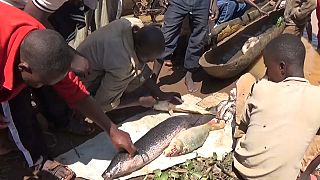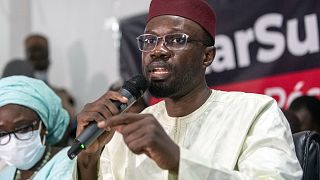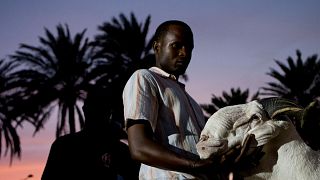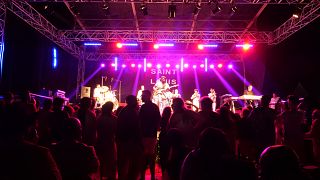Senegal
Since her birth on Senegal's coast, the ocean has always given Ndeye Yacine Dieng life. Her grandfather was a fisherman and her grandmother and mother processed fish.
Like generations of women, she helps support her family in the small community of Bargny by drying, smoking, salting and fermenting the catch brought home by male villagers. They were baptized by fish, these women say.
But when the pandemic struck, boats that once took as many as 50 men out to sea carried only a few. Many residents were too terrified to leave home, let alone fish, for fear of catching the virus.
When local women managed to get their hands on fish to process, they lacked buyers, as markets shut down and neighboring countries closed borders. Without savings, many families went from three daily meals to one or two.
Dieng is among more than a thousand women in Bargny, and many more in other villages dotting Senegal's coast, who process fish - the crucial link in a chain that constitutes one of the country's largest exports and employs hundreds of thousands of its residents.
"For my family, we lived a Calvary (crucifixion, meaning much suffering)," said Dieng, "The COVID has changed our work and our life."
But, she noted, "Our community is a community of solidarity."
That spirit sounds throughout Senegal with the motto "Teranga," a word in the Wolof language for hospitality, community and solidarity. People tell each other: "on es ensemble," a French phrase meaning "we are in this together."
Last month, the first true fishing season since the pandemic kicked off, bringing renewed hope to processors, their families and the village.
Bargny made an industrial park
The brightly painted vast wooden fishing boats called pirogues once again each carry dozens of men to sea, and people swarm the beach to help fishermen carry in their loads.
But challenges from the coronavirus - and so much more - remain.
Rising seas and climate change threaten livelihoods and homes; many can't afford to build new structures or move inland. A steel processing plant rising near Bargny's beach raises fears about pollution and will join a cement factory nearby.
"Since there is COVID, we live in fear," said Dieng, who has seven adult children. She explained that for most people in Bargny and especially for women processors life has been difficult in the last months. "Little by little, it's getting better," she said.
Dieng and fellow processors weathered the pandemic by relying on each other.
They're accustomed to being breadwinners - one expert estimated that each working woman in Senegal feeds seven or eight family members. Before the pandemic, a good season could bring Dieng 500,000 FCFA (US$1,000). Last year, she said, she made little to nothing.
Dieng's husband teaches the Quran at the mosque next door to their home, and the couple pooled their money with their children, with one son finding work repairing TVs.
Other women got help from family abroad or rented out parts of their refrigerators for storage.
They survived, but they missed their work, which isn't just a job - it's their heritage, their origins. "Processing is a pride," Dieng said. "It's my pride because I was born and baptized with "fishing money" (money coming from working with fish)."
Like Dieng, other women have been suffering with the pandemic. Last year, Ndeye Daour Diouf had to send her daughter -who worked with her processing- to clean houses to earn some money to buy food and pay debts of the family.
The 45-year-old fish processor and her husband, a fisherman, depend on the sea to feed their seven children and the two nephews they take care of, since Diouf's sister died some months ago.
"COVID-19 has affected the work a lot, because during COVID I did not work and had to stay at my house, sometimes my husband was going to the sea to catch some fish but sometimes he did not, or he did not get anything," Diouf said after working for hours under the sun and the smoke of the site, without having taken a rest.
"One woman who works there, is feeding about seven, eight people of her family and belonging. I'm not talking just your own kids, but you have your aunts you have your grandfather, you have about a whole community that you are feeding," said former lawmaker Cheikhou Oumar Sy, director of OSIDEA, Observatory for Monitoring Economic Development Indicators in Africa.
In Senegal, fish accounts for more than half of protein eaten by its 16 million residents - key for food security.
Most fishing in the country is small-scale - carried out in traditional, generations-old methods. It's referred to as artisanal fishing. Once processed, fish is sold to local and international buyers.
Industrial fishing is carried out in Senegal's waters as well, via motorized vessels and trawlers.
More than two dozen companies also specialize in industrial processing in the country alongside fishmeal factories and canning plants.
Fishmeal factories price women like Dieng out by paying more for fish and depleting resources - five kilos of fish are needed for one kilo of fishmeal, a lower-grade powder-like product used for farm animals and pets.
Senegal's government also has agreements with other countries allowing them to fish and imposing limits on the hauls. Monitoring what these boats from Europe, China and Russia harvest has proven difficult. Locals say outsiders devastate supply.
"If you take away the economy, if you take away this part of the job, if you take away and you bring projects that really impact their lives negatively, they will impact a thousand lives around them," Sy said.
Senegal has designated land near Bargny as an economic zone in its efforts to invest in redevelopment. Dieng and others are part of a rising collective voice of women in Senegal working for change along the coast and beyond.
Dieng's neighbour Fatou Samba - a town councilor and president of the Association of Women Processors of Fish Products - has testified about challenges in artisanal fishing.
Fatou said she is not against the "project that will develop Senegal" but against things that can put their work at risk and demanded more participation of women in the decisions.
"All over the world, especially in Africa, women are fighters, women are workers, women are responsible of the family," she said.
"We must bring women into decision-making positions, we must get them, we must accompany them, we must support them for the development of everyone," the leader added.
The pandemic has taught villagers in Bargny a crucial lesson: Money from fish may not always be there, and it's important to try to save.
Senegal imposed strict measures at the start of the pandemic. The government was widely commended, and restrictions largely eased. But the country's had more than 40,000 cases.
The pandemic also is not over, so Dieng and other women go door to door to raise awareness and urge people to get vaccinated. Volunteer and government campaigns aim to keep another wave at bay.
While spreading the word about the vaccine and how to prevent the virus, Dieng also carried another important message for the women of Senegal and around the world: "We say to all the women of the world to stand up and take their destiny into their own hands. Only work pays."
AP











11:19
Cyber Africa Forum highlights Benin's bold digital resilience [Business Africa]
Go to video
World Bank grants South Africa $1.5B for infrastructure, green energy
Go to video
What to know about the COVID variant that may cause 'razor blade' sore throats
11:16
Angola hosts U.S.-Africa summit amid calls to revive trade ties {Business Africa}
01:30
Abu Dhabi hosts first Global South Economic Forum
01:23
Fourth edition of China-Africa Economic and Trade Expo opens in Changsha